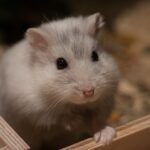Can Hamsters Eat Salami? The Hazards and Risks of Feeding Salami to Your Furry Friend
When it comes to the diet of our beloved hamsters, it is crucial to provide them with safe and nutritionally balanced meals. However, there are certain foods that can pose serious risks to their health and well-being. Salami, although enjoyed by us humans, is not a suitable food option for hamsters. Let’s delve into the reasons why salami should be avoided in their diet.
The Dangers of Salami for Hamsters: Health Concerns You Need to Know
Feeding salami to hamsters can lead to various health concerns that can jeopardize their overall well-being. Firstly, salami is typically high in sodium, which can be harmful to hamsters as they are small creatures with delicate systems. Excessive sodium intake can cause imbalances in their electrolytes and lead to dehydration.
Additionally, salami often contains high levels of fat and preservatives, such as nitrates and nitrites, which are known to be detrimental to hamsters’ health. These additives can lead to digestive issues, including diarrhea and upset stomach. The high fat content can also contribute to obesity, a condition that can lead to a myriad of health problems, such as heart disease and arthritis.
Potential Symptoms or Reactions from Feeding Salami to Your Hamster
If your hamster consumes salami, they may exhibit various symptoms or reactions as a result. Common signs of distress include diarrhea, vomiting, lethargy, and loss of appetite. These symptoms indicate that their digestive system is struggling to process the high fat content and harmful additives present in salami.
In severe cases, consuming salami can even lead to pancreatitis, a dangerous inflammation of the pancreas. This condition can cause excruciating pain and potentially be life-threatening for your furry friend.
Safe Alternatives: Foods and Treats for Hamsters
If you’re looking for safer food options and treats for your hamster, there are plenty of alternatives to consider. Opt for fresh fruits and vegetables, such as carrots, apples, and peas, which provide essential vitamins and fiber. Hamster-safe grains like oats and barley can also be included in their diet for added nutrients.
Moreover, commercially available hamster treats, specifically designed to meet their dietary needs, can be an excellent option. These treats are formulated to ensure optimal health without compromising their safety.
Tips to Prevent Your Hamster from Accessing Salami
Preventing your hamster from accessing salami is crucial to their well-being. Here are some tips and measures to ensure they steer clear of this harmful food:
- Securely store salami in a closed container or cupboard that is inaccessible to your hamster.
- When enjoying salami yourself, make sure to do so in areas away from your hamster’s cage to prevent accidental sharing.
- Regularly clean your hamster’s living area to remove any potential food scraps or leftovers that may attract their attention.
- Stay mindful and educate other household members about the hazards of feeding salami to hamsters to ensure consistent caution.
Conclusion
In conclusion, salami is not suitable for hamsters due to its high sodium, fat, and preservative content. Feeding salami to your furry friend can result in various health concerns, including electrolyte imbalances, digestive issues, obesity, and even pancreatitis. Opt for hamster-safe alternatives and treats to ensure their well-being and consider implementing preventative measures to keep salami out of reach. Responsible and thoughtful pet care is paramount in ensuring a happy and healthy life for our beloved hamsters.






